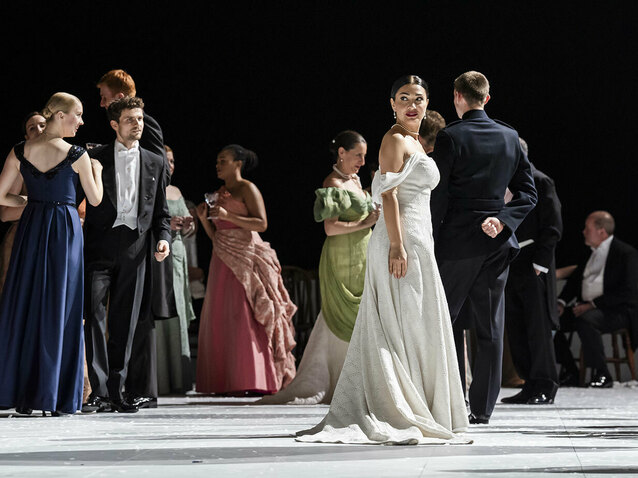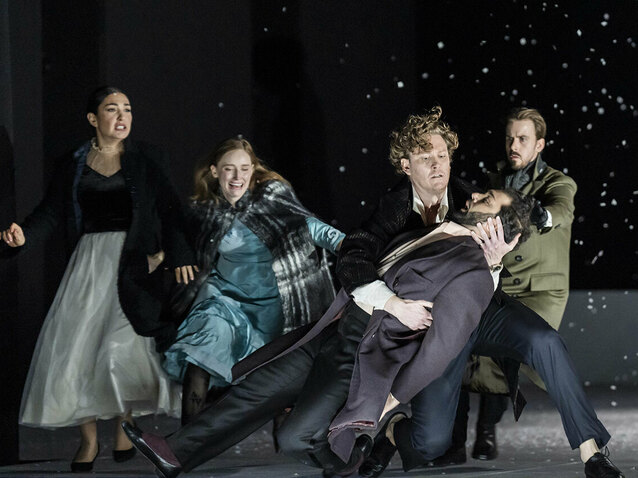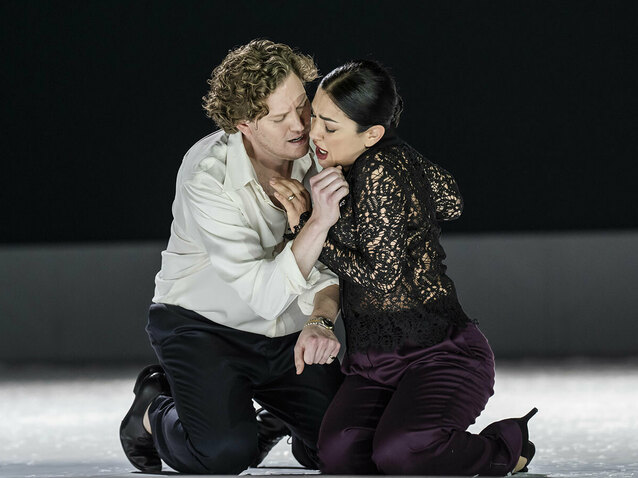 © Tristram Kenton
© Tristram Kenton
Piotr Tchaïkovski’s Eugene Onegin, which premiered in Moscow in 1879, is based on Alexander Pushkin’s eponymous verse poem. The libretto, which was organised by the composer himself, closely follows certain passages in its source material and retains much of the poetry. Set in the 1820s in and around St Petersburg, it sees Tatyana, the daughter of landowner Madame Larina, fall in love with one Eugene Onegin. She is introduced to him when her sister Olga’s fiancé Lensky visits the family in the country and brings this mysterious friend with him. Tatyana is instantly attracted to Onegin, and writes him a letter in which she pours out her feelings, saying she doubts she will ever feel the same about anyone else.
After receiving it, Onegin tells her that he does not love easily and is unsuited to marriage. While he does not do so unkindly, the way in which he rejects her while warning her not to be so open emotionally could be classed as patronising if not downright cruel. At the subsequent ball at the Larin house, Onegin grows increasingly irritated when he hears people gossiping about him and Tatyana. In response, he starts flirting and dancing with Olga, inspiring Lensky’s extreme jealousy. Lensky confronts Onegin and, as things become increasingly heated, they end up agreeing to a duel. Even as they meet for it both are reluctant to go ahead, realising the senselessness in their enmity, but neither is willing to back down and Onegin kills Lensky.
Shunned by society and feeling remorseful at Lensky’s death, Onegin spends the next years travelling Europe. He returns to St Petersburg and at a ball sees Tatyana who is now married to Prince Gremin. Onegin cannot believe that this aristocratic beauty is the young girl he once rejected, and is instantly filled with regret. When they meet in private Onegin declares his love for Tatyana, and she admits that she still feels the same way about him. She says, however, she will remain true to her husband in spite of her feelings, and leaves him alone and completely devastated.

Kristina Mkhitaryan (Tatyana), Eugene Onegin (c) Tristram Kenton
American director Ted Huffman’s new production for the Royal Ballet and Opera sets the action broadly in the modern day, but far more important than the time chosen is the ‘minimalist’ approach to the drama. Huffman’s intention was for a world to emerge that ‘in a sense, exists only in the audience’s mind’, and Hyemi Shin’s set comprises one large, virtually bare area. While such an approach might risk swamping the performers by making them feel too small, in the event the opposite is the case because the space feels expansive enough to put the entire enterprise on a scale that is fitting for this great opera. In fact, the whole stage could be interpreted as an initially blank book in which Tatyana’s dreams of how everything should be are written, only affairs do not play out as she would wish.
The drama starts well as just a few people grace the stage, and is sustained as the chorus is introduced. Its members initially play peasants and are first heard ‘approaching’ from offstage, with their beautiful sound drifting through to the auditorium. Once they have arrived, they take centre stage in the dancing, which helps the audience to feel as involved in the scene as those who are participating in it.
The first major difficulty arises during the ‘letter aria’. As Tatyana pours out her feelings for Onegin on paper she is not alone, as would normally be the case, as Olga is listening and actually doing the writing. This destroys the entire notion that as Tatyana decides what to write, the only conversation she is having with herself, which means there is no-one to suggest she moderate her output and that she can easily convince herself she is doing the right thing. One also wonders, if Olga had really been present and heard just how deeply Tatyana’s feelings for Onegin ran, whether she would ever have countenanced the thought of dancing with him at the ball.

Gordon Bintner (Eugene Onegin) and Liparit Avetisyan (Lensky) Eugene Onegin (c) Tristram Kenton
One could argue that Olga is not physically present in the scene, and merely represents the side of Tatyana that urges herself on. If so, however, it seems a shame that Huffman, who puts so much faith in the relevant performers to fill the space free from excessive distractions, should not do so on the one occasion when a lengthy solo performance is really required. Before the Larin ball we see Onegin and Olga in a passionate embrace, and yet there is really no evidence that they have any feelings for each other, especially at this stage. Even if this is not intended to represent something that happens literally, the problem is that when too many episodes that are intended to be symbolic or to have occurred in the imagination are presented physically, they start to become the reality for the audience.
The end of the Larin ball is rendered effectively as we find ourselves genuinely believing in how a situation that no-one ever intended to get so out of control could escalate to the point where two former friends have agreed to a duel. It would be wrong to give away how the fight actually plays out, but it raises the question of why, given Onegin’s actions during it, society might subsequently shun him, although the answer may be because people do not believe his account.
If we take the view that Lensky’s fear all along is that Onegin is a ‘better’ man than him, and hence will always end up taking what matters most to him, what he does at the duel just about makes sense. However, on an increasing number of occasions in the second half, we find ourselves explaining in our heads why an idea is intelligent as opposed to feeling whisked along by the emotion that should be inherent in the drama. Ten dancers, choreographed by Lucy Burge, frequently appear and lead the way in the Waltz, Mazurka and Polonaise. What they deliver is highly accomplished, but it is perhaps more thought provoking than visceral. Typically, they build up these dances so that some chorus members and soloists also become involved. However, because many others remain as observers, they do not always sweep us along with their scale and grandeur, and thus still end up appealing more to the head than the heart. Such issues mean that, while there is a considerable amount with which to engage, the evening is not entirely persuasive from start to finish.

Gordon Bintner (Eugene Onegin) and Kristiana Mkhitaryan (Tatyana) Eugene Onegin (c) Tristram Kenton
The evening’s musical credentials are notably strong, with conductor Henrik Nánási eliciting much from the Orchestra of the Royal Opera House. Its output is always supported by high levels of smoothness and balance, but something more mysterious seems to underpin the most elegant lines while even the ostensibly exuberant ones have something else going on underneath. Kristina Mkhitaryan is quite a multi-faceted Tatyana whose soprano can be both shimmering and sumptuous. She introduces another dimension again by delivering key passages in the ‘letter aria’ with a softness that highlights the intimate nature of her feelings, though with a clarity that means her sound still reaches the farthest corners of the house. As Onegin, Gordon Bintner reveals a persuasive bass-baritone and looks every inch the part, though he actually plays it quite differently to usual. When he asks Tatyana if it is not dreadfully boring for her in the country, he sounds as if he is generally interested in her answer and hence welfare, when normally it seems obvious he is simply stating how he is bored. As a consequence, his ‘deception’ seems to run particularly deep because his conversation makes it seem as if he is really engaging with her.
Liparit Avetisyan is an extremely effective Lensky as his tenor feels both light and strong, and his performance of ‘Kuda, kuda vï udalilis’ proves to be an undoubted highlight of the evening. Avery Amereau is equally outstanding as Olga as she reveals a notably rich and warm mezzo-soprano. There is excellent support from Alison Kettlewell and Rhonda Browne as Madame Larina and Filipyevna respectively, while Christophe Mortagne really goes to town portraying Monsieur Triquet, having also taken the role here in 2013 in Kasper Holten’s production. Dmitry Belosselskiy is set to play Prince Gremin from 30 September onwards, but on opening night the part was taken by Brindley Sherratt who provided a masterclass in how to perform ‘Lyubvi fse vozrastï pokornï’, such was the strength of his bass and the prowess in his delivery.
By Sam Smith
Eugene Onegin | 24 September - 14 October 2024 | Royal Ballet and Opera, Covent Garden
the 26 of September, 2024 | Print
Comments